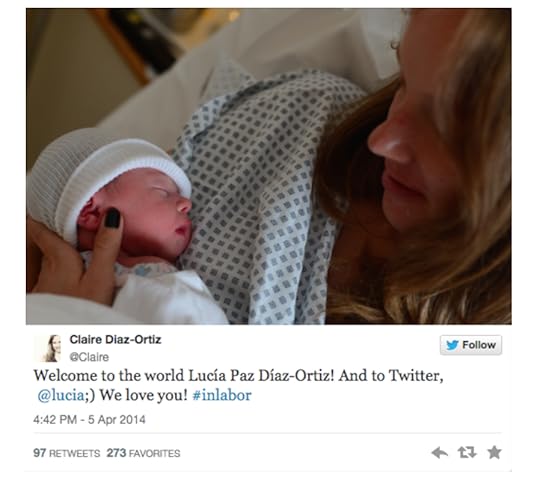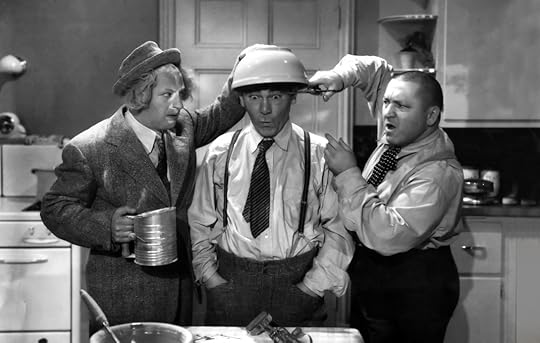Donald Miller's Blog, page 66
April 17, 2014
How To Fail And Still Win, A Guide To Not Losing Your Cool
I like those television documentaries on the NFL channel called “A Football Life.” I especially like the ones about coaches. I learn something new with every coach who is profiled.
Whether they’re a coach or player, though, I’ve noticed something each successful person has had in common: They lose well.
For some reason, those who win in the end have an ability to treat a setback like a speed bump rather than a car accident.

*Photo Credit: veggiefrog, Creative Commons
I say this because just the other day I screwed up a meeting. I was late because I scheduled it wrongly on my calendar. It was a late meeting, so after I messed up I went home, stood in the back yard and threw a tennis ball for my dog. The whole time, though, the voices started getting to me. They were saying how irresponsible I’d been with my friends time, how I wasn’t wired to lead or manage, how I was too much of an artist and so on and so on.
The reality was all things were going well.
There was no reason to panic. We’d overshot our first-quarter goals by 50% and I was wrapping up a new book. Failure was nowhere in sight, but my mind was nevertheless causing drama.
Turns out my friend forgave me and thought nothing of it, so all was fine there, but the real cost wasn’t from the missed meeting, it was from the voices in my head. I’d turned a speed bump into a car accident.
I remembered the documentary about Jerry Jones, though, and how he had to stand there on the field and endure more than a few losses his first season as coach of the Cowboys, and how he had to trust his plan to work and his team to come on board. He had to forgive himself of his mistakes, stay positive and not let the pressure get to him.
I stood there in the yard thinking, okay, are you going to treat this like a speed bump or a brick wall?
Truth is everybody experiences setbacks. Everybody makes mistakes. But how we react to those events is what separates those who succeed and allows them to accomplish their goals.
The next morning I got up, made my to-do list and pushed on. It’s a long season, after all. You’re going to drop a couple games on the way to the Superbowl.
How To Fail And Still Win, A Guide To Not Losing Your Cool is a post from: Storyline Blog
April 16, 2014
Your Story is Not As Beautiful As It Could Be
I’ve been in a writing drought lately. I get up every morning and sit down to my computer. Words get typed into the screen. But they aren’t as good as the words I’m used to writing. They aren’t as good as they could be. I’m not being modest. I know what I’m capable of as a writer, and this is not it.
So what am I supposed to do to reach my potential?
There’s something I always do when I’m dealing with a creative block of some kind. It comes from an artist and author named Julia Cameron who I love and recommend completely. She wrote a book called The Artist’s Way that is all about helping artists to cultivate their creative energy; and her words have helped me navigate many emotional blockages in my writing lifetime.
Even if you’re not an “artist” by profession, I recommend this book.
It’s like therapy for $29.99.
Anyway, one of the things Cameron recommends is something she calls Morning Pages—a practice which involves getting up each morning and writing, first thing, whatever comes to mind. Typically, these pages are handwritten, and should add up to about three pages. This is the amount of space, Cameron says, that it takes to get over yourself and write something good.

*Photo Credit: daniel sandoval, Creative Commons
I think there are three reasons Morning Pages, time and time again, have helped me achieve my best writing.
1. Early in the morning, your inner critic is still “sleeping” so you get to write without fear of judgement from yourself.
2. There’s only so long you can complain about a circumstance in your life (about two and a half pages, Cameron suggests) without doing something to fix it.
3. Finally, Morning Pages remind you of one of the cardinal rules of writing: you can’t write and edit at the same time.
That third reason really gets me: You can’t write an edit at the same time.
One of the cool things about the stream-of-consciousness directive of Morning Pages is that it forces you to keep writing, even when you aren’t sure where you’re headed with a particular thought, even if things feel scattered, even if you don’t love your word choice or the way dialogue unfolded in a particular passage.
This can be one of the most difficult things to do as a writer (or any kind of creative)—to stop being critical of yourself for long enough to get some writing done. Your instinct is to go back and fix mistakes before moving on, to make sure everything is perfect before you keep creating. And yet, this tendency is paralyzing.
Creating isn’t a perfect process—it’s a messy one.
I don’t know about you, but for me, this tendency leaks into more than just my writing.
When it comes to living my life, I find myself fluctuating quickly back and forth between these two tasks, between “creating” and “editing.” By that I mean, I so often find myself being critical of my life while I’m busy living it. Every time I try to do something, to choose something, to take a risk, there’s the critical voice, the “editor’s” voice, telling me to fix things before they ever go wrong.
That voice grips me with fear of embarrassment, fear of regret, and a fear that what I’m creating won’t be any good.
It has this way of stopping me in my tracks before I even get started.
And if you ask me, this is a huge tragedy—
And might be stealing the beauty of each of our stories. It might be preventing us from getting to our best ideas, from acting on our most passionate convictions, from having the courage to take a stand or to simply let life unfold in it’s thrilling and messy way, right in front of us. If we’re busy correcting ourselves or redirecting ourselves or trying to make our lives seem palatable or understandable or organized…
We might be missing what makes our lives truly amazing—the fact that they aren’t any of these things.
They are wild and untamed and incredible.
We are given so much freedom to be creative.
Of course, there comes a time for editing.
Every good writer knows this. Every good writers knows there is a time to let your brain run wild with ideas, and a time to reign it in. There is a time to put every thought you have down on paper, and time to be brutal in the way you cut them out. An unedited story is rarely a good story. But you can’t do both at once.
You can’t edit your life while you’re living it.
What if we set aside a specific time for living our stories, and then a specific time for editing them? We do this with writing projects. What if we chose intentional moments of reflection, designed to get feedback from those who are creating with us, from ourselves, and from God? And what if—between those times—we just gave ourselves permission to live a messy, imperfect, passionate, fearless life?
I can’t help but think the result would be beautiful.
Your Story is Not As Beautiful As It Could Be is a post from: Storyline Blog
April 15, 2014
This is Sometimes More Important Than Praying
A few days ago, my family and I returned home after a two-month long road trip. On the way back, my husband Kyle and I had our customary debriefing conversation per easing back in to normal life: What was your favorite part of the trip? What did you learn? What makes you excited to head back home? What makes you not so excited?
(We’re not really very formal about this—we just ask each other questions off the top of our heads while the kids go nuts in the back seats.)
We had just driven 9,000 miles up and down both the east and west coasts, with all three kids in tow and work in our backpacks. For 59 days, we did school from picnic tables at riverfront rest stops, worked and wrote from laptops balanced on our knees in the passenger seat, and spent countless evenings making new friends and reuniting with old.

*Photo Credit: Kyle Monahan, Creative Commons
It was a fantastic time. It was also exhausting.
So when Kyle asked me what I was most looking forward to about returning to normal home life in central Oregon, I paused for awhile. And I didn’t answer.
Because I had no answer. I couldn’t think straight, I was so tired.
That’s not to say I wasn’t looking forward to returning—I was. Never did I think I’d look forward to a more liturgical routine of laundry, cooking out of my own kitchen, and having more than one room for the five of us. Regular life sounded delicious.
So the fact that I couldn’t answer was a sign as to how exhausted I was. I honestly had no idea what sounded good. I didn’t know what I needed. I didn’t know what to do tomorrow. Next steps were a blur beyond crawling in to my familiar shower and then in to my familiar bed.
It reminded me of that time the prophet Elijah was running from Jezebel and was so exhausted that he crashed by a tree in the desert, ready to die. God didn’t infuse him supernaturally with needed energy to make it through the desert, nor did he ask Elijah to power through his exhaustion in spite of it all.
No—God sent an angel with food, drink, and some time to sleep. Basically, he provided Elijah with his concrete, felt needs. Then the text in 1 Kings says he was able to get back up and at ‘em after caring for his body for a few days.
Totally not comparing myself to Elijah here—really.
But I am struck by how important to God were Elijah’s basic needs of food, water, and rest; that these weren’t spiritually inferior to prayer or meditation. God completely acknowledges Elijah’s humanity and his need for nourishment and a serious nap.
And so it is with us, I think. I know I far too often fail at simple things like going to bed at a decent hour, going for regular runs, drinking plenty of water, and getting enough veggies on my plate. And I’d argue that those things matter to our well-being just as much as praise and worship, because we are more than spiritual beings. God hardwired us to need things to replenish our bodies.
So I shelved that deeper life question, sipped some water, and stared out the window as the Cascade mountains ambled by. And after getting the three kiddos to bed a few hours later, I relished in a long, hot shower and gave my good ol’ pillow a big hug. And then passed out.
After a few days, after sleeping in familiarity and eating some real food, I then cracked open my journal and scribbled out some of those deeper questions. What’s next? What do you have for me, God?
Pursue great things, yes, and do them to honor and worship your Creator. But don’t forget to take care of yourself in the process, sometimes in the simplest of ways. When you’re looking at a journey in front of you, perhaps your next step is to eat a big sandwich and chug some agua.
This is Sometimes More Important Than Praying is a post from: Storyline Blog
April 14, 2014
Why People Are Drawn to Simplicity Over Truth
The truth is people aren’t drawn to truth, they’re drawn to simplicity. Recent research from Harvard suggests that customers don’t necessarily buy the best products, they buy the products that are the easiest to understand and the easiest to purchase.
This isn’t only true in consumer habits, though, it’s true in subscribing to ideas as well. Whether we’re talking about politics, religion or philosophy, a leader who can simplify ideas for the masses will likely rise.
But there’s a problem.
And the problem is this: The truth isn’t simple. In the world God made, no area of life is easy to understand. Scientists have yet to figure out the complicated nature of the universe. Doctors are still in the infant stages of understanding the brain. And God knows we’ve no proof or our own origins.

*Photo Credit: Oleh Slobodeniuk, Creative Commons
So why is it that we can turn on a 24 hour news station, or walk into church one Sunday morning and think we can get the whole of truth into our heads?
The reality is, of course, we can’t. But it’s comforting to think we can, and so we buy in. Is the Tea Party right? Who knows, it’s complicated. Can the whole of scripture be broken down into 5 bullet points? No thinker in their right mind would believe that, except for the millions who do.
So why is it we are so afraid of mystery?
Why can’t we admit we know some things but not everything?
In my opinion, it’s because humans fear a life in which they aren’t in control.
And knowledge over an issue gives us the false sense we can predict it and understand it and in some ways control it. (Tweet This)
Doesn’t our broken down systematic theology also offer us the illusion we can predict God? And isn’t that enticing?
Certainly there is truth, and certainly there is absolute truth, but, as G.K. Chesterton said, only a fool would think they could cram all of heaven into their heads.
Here’s how to know if a leader or teacher is trustworthy: They consistently say “we don’t have that information” and no longer pretend we do. Some things are for God to know and for us to trust. The rest of life is about making wise decisions based on the information we’ve been given. Which is less than we’re comfortable believing.
Why People Are Drawn to Simplicity Over Truth is a post from: Storyline Blog
April 11, 2014
What Gets a Customer’s Attention in an Ad?
The story element customers are subconsciously scanning for as they watch a commercial (or browse a website) is this: results.
By that I mean they want to know what is going to happen if they engage in the story you’re pitching to them.
We are hardwired to think in the form of story, and most stories are going to one of two places: a successful ending or a tragic ending.
When brands help their customers understand how they can create a successful ending for them, or how they can help them avoid a tragic ending, customers pay attention.
Here’s a great example.
H&R Block released two ads in their Get Your Billion Back, America campaign. Both take place on an aircraft carrier and both send the same message. But they go about it differently.
Both commercials focus on their plan to get your billion back.
The first winsomely shows a tax accountant greeting his money as it returns to him from air, land and sea. Before the end of the commercial, they display the tagline “Your Money is Waiting, Get it Back with Block”. In just over 15 seconds they have established themselves as a guide who is able to provide their customer with the successful ending they desire — more of their money returning on their tax return.
The second video does the same thing, but with the addition of one element.
It shows the negative outcome of what could happen to someone who doesn’t use their service.
“This is your money — a billion dollars.”
It’s what’s left over when people do their own taxes, maybe get a refund and think they’re done.” It’s a tragic ending that causes fear to resonate with most people — the fear of not claiming money you are entitled to.
This possible outcome may even trigger the internal fear of being stupid (it does for me).
In most good stories, the author will allude to a potential tragedy on the pathway to a successful ending. Audiences want to be shown what could potentially happen to the hero on their quest. Without disastrous potential, victory wouldn’t taste as sweet.
The comedy that ensues in the end of the second video is the same as the first — as a client of H&R Block, you will have the tools you need to keep the money you deserve.
Notice the subtlety of the tragic allusion.
Since tragedy is not far from our minds, there’s no need to belabor the point, to do so may even cause the potential customer to feel manipulated. But hinting to how your product can help prevent tragedy for the customer along their journey is a great ingredient to have in the mix.
Like salt in a recipe for bread, it only takes a little; too much tragedy could bring about a similar ending for your brand.
What Makes A Customer Purchase?
It’s tax season, and Turbo Tax seems to be making about as much money as the IRS these days.
They’re everywhere.
A campaign I saw recently was clear, compelling and effective. We could break down entire campaign, but for now, I want to focus on one element that worked well for them. You may not even have noticed it.
But the element was this: Time is running out.

Brands find if they let the customer know when an offer is expiring, customers are much more likely to place an order. When a customer knows the opportunity is soon going to go away, they won’t delay.
In story structure, storytellers use an expiring time factor to make the story more exciting.
A guy has to disarm a bomb before it’s too late. A woman has to get the story written before the newspaper deadline and so forth. Adding an expiring time dimension to a story ramps up the dramatic tension and makes the story more compelling.
It works similarly in your marketing campaign.
Suddenly the ad feels more compelling, as though the hero of your story (the customer) needs to take action soon or they will miss out.
And of course, when it comes to filing taxes, we are all under a deadline.
Why Your Team Members Should be able to Tell a Story
Our friend Claire Diaz-Ortiz recently live-tweeted the birth of she and her husband’s first child.
And the world paid attention.
Claire is an executive at Twitter, one of the better story-telling companies in operation today. Twitter is all about communication, after all, so the fact she live-tweeted the drive to the hospital, the car breaking down, the screaming ladies in the ER and on and on makes complete sense.
Twitter is how we share our lives.
What’s amazing, though, is her story got picked up in international news and got Twitter an enormous amount of winsome, fun press.
Claire was strategic in what she shared.
Humorous, charming and delightful, she kept her audience of hundreds-of-thousands enthralled as the day went on.
What’s important to remember, though, is Claire knew how to tastefully tell a story. And in 140 characters or less, we might ad.
Tweets like:

…kept us all enthralled, but only because a clear story structure was in place.
1. We knew what was going to happen (A baby was going to be born)
2. We knew there was a challenge (It’s called having a baby)
When a character wants something and has to face a challenge to make it happen, you’ve got the stuff of stories.
Many people simply tweet the routine happenings of their day, but how many of your employees know enough about story structure to frame their tweets in such a way they are interesting? Tell a good story, after all, and you’ll capture the attention of the world.
How did Claire’s Twitter story end? Quite beautifully.

Welcome to the world, Lucia. If you’re anything like your wonderful mom, you’ll be telling quite a story with your life.
Follow Claire on twitter at @Claire. And baby Lucia at @Lucia.
Why You Shouldn’t Feel Guilty in the Face of Injustice
I remember the most malnourished children I’ve ever seen.
I was in Zimbabwe on a mission trip, and our bus had broken down somewhere between Victoria Falls and Bulaweyo, the second largest city in the country. The whole group climbed out of the bus to kill time on the side of the road while we waited for repairs to be made.
There happened to be a village nearby and soon we were surrounded by a bunch of kids wondering what these white people were doing in such a remote place. Most of the children we met there weren’t wearing shoes (Zimbabwean kids don’t like shoes), but they had good clothes and looked relatively healthy and energetic.
A few minutes into meeting them, two smaller children—a girl and boy—arrived.
They were acting odd, almost crazy. Their hair was reddish colored, clothes barely held together, and stomachs protruding. It took me a minute, but after observing, I realized why these two were acting so strangely and different from the others: They were starving.

*Photo Credit: Joris-Jan, Creative Commons
When we realized a mechanic wouldn’t be showing up anytime soon, our group leaders assessed the lunch situation. There certainly wasn’t enough food for the entire crowd that had gathered with us by the road, so they decided to serve only our group on the bus. They were being held responsible for our well-being, so this made sense.
But I refused to eat.
Instead of joining my team, I sat on the front row of the bus and wallowed. And I thought everyone else shouldn’t eat too. They should all feel just as bad as I was feeling. I kept asking God why I had so much when the young children outside the window had so little.
I now realize how unproductive that response was. Though I was focusing on the poor and needy around me, I was also very self-focused, allowing guilt to be my dominant emotion.
Tim Keller said in a sermon once that, “The reason you can’t deal with your guilt is that you believe God is simply merciful.” He goes on to talk about God’s justice and how believing in the just side of God along with His mercy will draw us out of guilt. If we forget the just part of God, our work against poverty or slavery or hunger will be done out of a type of frustration, as if we are doing this job because God isn’t. He isn’t fair, so we must work to make things fair for all people.
I questioned God’s mercy as I sat alone on the front row of the bus, quilted by defiance.
I forgot about His justice, and I was angry with Him. But do you know what not eating and feeling angry and guilty did for the starving children outside? Nothing.
Guilt is as helpful as apathy in a scenario like that. But if we can believe in the mercy and justice of our God, we can get past the guilt and apathy to the place where empathy and action dwell.
Why You Shouldn’t Feel Guilty in the Face of Injustice is a post from: Storyline Blog
April 10, 2014
How Stuff Gets Created
I’m learning the fruit of my creative effort often ripens instantly.
I’ll sit down and get thousands of words, but then a week later, working with the same discipline, will have nothing. But my job is not to make the words come. Who am I to make the words come?
My job is no different than a farmer. I till the land. I fertilize the soil. I plant the seeds.

*Photo Credit: twm1340, Creative Commons
Unlike the farmer, though, I am surprised when the green shoots sprout in the spring.
I think perhaps it is magic, and it will never happen for me again. But the farmer knows if he tills the land, and is blessed enough to get rain, the harvest will come.
How Stuff Gets Created is a post from: Storyline Blog
April 9, 2014
Why Jesus Invites the Wrong People to the Party
I have a confession to make that may make some of you dismiss me as having neither taste nor class. Judge me if you will:
I LIKE THE THREE STOOGES.
There.
I said it.
When Larry hits Curly on the head with a sledgehammer and it makes a metal clanking noise, I think it’s hilarious. And when Moe tries to eat lobster bisque and a huge lobster claw comes out of the bowl, grabbing and twisting his nose with a loud crunching sound, it cracks me up.
Aside from the fun of slapstick, what I love is the way these guys always show up at the wrong place at the wrong time. They’re never appropriate and are always misfits.

*Photo Credit: twm1340, Creative Commons
Find me a party filled with snooty elites, and Larry, Moe and Curly will arrive as waiters. Within minutes they’ve instigated a pie fight. Bejeweled women in evening gowns and men in suits are covered in whipped cream. The smack of a pie to the face remains one of my favorite sounds.
When Curly’s pet mouse runs up the leg of a guy’s pants or down the back of a woman’s dress, causing a flailing domino effect of chaos in the ballroom – how great is that?
Somehow, in their foolishness, they end up exposing the crooks, the arrogant, and the self-important.
Bumbling their way through situation after situation, the stooges make us laugh, and if we’re honest, we see ourselves in the people they expose.
Recently, my family was visiting an old church in England. The parish church had been active since 1777 when it was built. Benedict Arnold was buried in the basement, which I thought was a nice touch.
The church, festively decorated with holiday trimmings, was stunning. The service, a quiet and solemn liturgy, was punctuated by music performed with perfection. At one point during the service, the choir began to sing its anthem. Half way through it, a lone figure shuffled down the aisle. It was a young man in his 20s with Downs Syndrome. Under his arm, he carried a bongo drum.
Making his way to the front of the church, he sat down at the grand piano, stage right.
By this time, he had everyone’s attention, particularly the members of the choir. There was this “What is he going to do?” fear in the room. I’m sure there were some that felt the night could be ruined – this night that took many hours and much energy to prepare.
Pulling his drum into position, he began tapping it with his fingers, as quietly as a mouse walking across the floor. Then his lips began to move, his singing as silent as his drumming.
I think it hit us all at the same time.
This young man woke us up to the fact that we were out of place, not him. While we were worried about having an uninterrupted service of worship, he was actually experiencing it, living it, embracing it, and loving it.
I thought about Jesus, always inviting the wrong people to the party and freaking everyone out. And by his invitation, he said to the outcast, the misfits, and the marginalized – “You belong.”
And as I watched the young man singing and playing in his beautiful act of worship, I felt the pie hit my face as a mouse ran up my leg.
Why Jesus Invites the Wrong People to the Party is a post from: Storyline Blog
Donald Miller's Blog
- Donald Miller's profile
- 2745 followers



